The Wisconsin State Laboratory of Hygiene’s campus lab building was bustling with “students” on July 26th and 27th as 12 grandparent-grandkid pairs “majored” in genetics and newborn screening as part of the University of Wisconsin-Madison’s Grandparents University (GPU).
GPU started at UW-Madison in 2001 and runs for two consecutive days for three consecutive weeks every July. Grandparents and grandkids choose from more than 20+ “majors”, earning a GPU “degree” at the end of their stay on campus.
WSLH Newborn Screening Laboratory Co-Director Dr. Patrice Held heard about GPU from a personal contact and got the ball rolling.
“I reached out to the organizers to learn details about GPU and whether our laboratory would be a good ‘major’ to consider for the program,” Patrice said. “They were very excited to have us participate! And I thought it would be a great opportunity for us as well.”
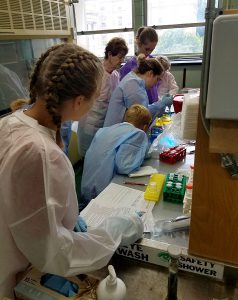
Molecular Geneticist Maureen McCormack demonstrates loading a gel with colored solution.
The Cytogenetics/Molecular Genetics and Newborn Screening Laboratories teamed up to create a “major” for Grandparents University. Because of the size of the group, grandparent-grandkid pairs were split into two groups, with one group visiting newborn screening and the other visiting genetics on Thursday afternoon and then switching for the Friday morning session.
According to WSLH Genetic Counselor Kimberly Anderson, “Our overall learning objectives were to: learn about how your inherited genes influence who you are and how your body functions; tour the cytogenetics and newborn screening departments at the State Laboratory of Hygiene and work hands-on with the chemists and cytogeneticists to learn how they use genetic information to help sick babies.”
Kimberly adds that for the genetics portion of the “major”, cytogenetics and molecular genetics staff walked the grandparents and grandkids through the steps of DNA extraction and gel electrophoresis. Students were able to extract (precipitate) their own DNA from their saliva and watch how different molecularly weighted colored solutions moved through an agarose gel. They also discussed how chromosomal imbalances can lead to genetic disorders, looked at human and mouse chromosomes under the microscope and learned the basic steps in chromosome identification and analysis.
For newborn screening, students had a mystery to solve – which disorder did their “baby” have?
WSLH Chemist Michelle Berry explains –
“In newborn screening (NBS) we created mock NBS reports with just numerical values. Our students’ job was to go into specific areas of the lab and learn about what diseases we screen for, how we screen for them, how the instrumentation works and what the treatment is for each disease we diagnose. We had:
- Cystic fibrosis mutation station where each grandparent-grandkid pair flipped the paternal coins to determine their own genetic mutation status
- Endocrine area where each pair developed their own biotinidase enzyme activity
- NBS specimen card receiving activity where each pair was able to number NBS cards and use the automated punchers to punch fake specimens for lab use
- Hemoglobinopathies area where pairs learned about gel electrophoresis and were able to read their own gels
- Mass Spectrometry area where pairs learned about phenylketonuria (PKU) and were able use automated pipettes
- SCID (Severe Combined Immune Deficiency) area where pairs were able to see an automated pipettor in action
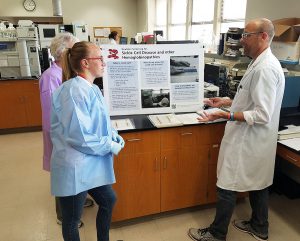
Newborn Screening (NBS) Chemist Mike Hansen explains how the WSLH screens newborn babies for hemoglobin disorders like sickle cell disease and others. Students also read gels, just like the NBS chemists do.
At the conclusion, every participant shared which disease their pretend baby was identified with and were invited to try a PKU formula that is used for supplemental nutrition by people that are diagnosed with PKU.”
Patrice said the newborn screening portion was definitely a team effort.
“Almost everyone in newborn screening took part in the GPU,” she said. “The ‘students’ rotated through each of the different sections. A chemist in each section described the work to the students, but the other chemists had to work ‘extra’ hard to cover all the testing for the days.”
WSLH staff who participated found the event to be a fun experience.
And a few days later Patrice heard from one of the grandparents –
“We are so very happy that we were able to attend the Grandparent’s University Genetics major this year! It was one of our favorite majors. And this was our last year to attend GPU, so we had a great finale! Every staff member was exceptional; the material was extremely interesting and well-presented (loved the hands-on opportunities); and learning about the services you provide and the research you do was an extremely rewarding experience. Thanks to all of you!”



 The
The 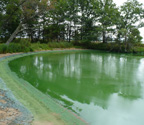 The Centers for Disease Control and Prevention (CDC) published a
The Centers for Disease Control and Prevention (CDC) published a 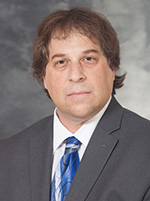 James Schauer, PhD, PE, MBA, director of the Wisconsin State Laboratory of Hygiene and Peterson-Radar-Hawnn Professor of Civil and Environmental Engineering at UW-Madison, has been named a 2018 U.S. Science Envoy by the U.S. Department of State.
James Schauer, PhD, PE, MBA, director of the Wisconsin State Laboratory of Hygiene and Peterson-Radar-Hawnn Professor of Civil and Environmental Engineering at UW-Madison, has been named a 2018 U.S. Science Envoy by the U.S. Department of State.

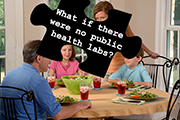 A new Association of Public Health Laboratories (APHL)
A new Association of Public Health Laboratories (APHL)